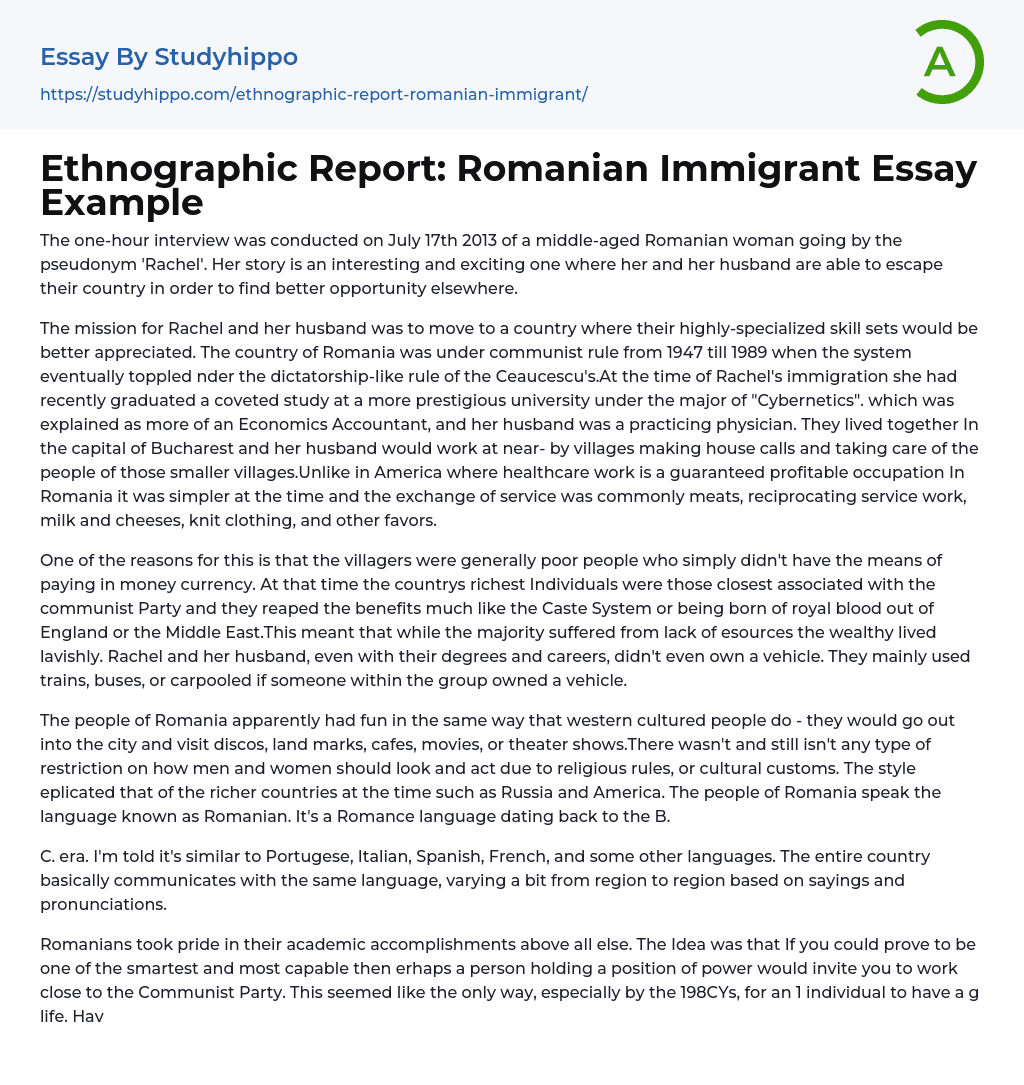'Rachel', a middle-aged Romanian woman, gave an hour-long interview on July 17th, 2013. During the interview, she shared an enthralling tale about her and her husband's decision to leave their home country in search of better opportunities abroad.
Rachel and her husband chose to relocate to a country where their specialized skills would be valued. Romania was ruled by communism from 1947-1989, until it was overthrown by the Ceaucescu dictatorship. Rachel had recently graduated from a prestigious university with a degree in "Cybernetics", where she focused on Economics Accountancy. Her husband worked as a medical practitioner while they lived together in Bucharest, providing medical care to neighboring villages. In Romania, the healthcare industry did not yield as much profit compared to America and compensation for services often involved bartering goods such as meat, cheese, and clothin
...g.
One of the reasons behind this is the economic status of the villagers, who were generally impoverished and unable to pay with money currency. During this time, those closest to the communist Party were the richest individuals in the country and enjoyed similar benefits to those born into royalty in England or the Middle East, or within a caste system. As a result, those with less resources suffered while the wealthy lived in luxury. Rachel and her husband, despite having degrees and careers, did not possess a vehicle and relied on trains, buses, or carpooling if someone within their group had one available.
Similar to Western cultures, Romanians participate in various leisure activities such as visiting clubs, tourist attractions, coffee houses, movie theaters, and theatrical shows. There are no limitations on behavior or attire due to cultural or religious beliefs. Romania's
way of living is influenced by prosperous countries like Russia and America. The primary language spoken in Romania is Romanian - a Romance language with ancient origins.
In the C. era, a language was spoken that had similarities to Portuguese, Italian, Spanish, French and other languages. It varied slightly in local expressions and pronunciations but there is a common language used throughout the entire country.
The importance of academic achievements for Romanians was significant, as it was widely believed that possessing intelligence and capability could result in securing a government position. This value became even more crucial during the 1980s when opportunities were scarce. With limited positions available after high school, many young Romanians either joined the workforce or were recruited into military service. Serving at least one to two years in the military was mandatory unless they had a physical disability or were attending college. Thus, obtaining excellent grades to enroll in university held great significance. However, despite the general belief that education led to better career prospects, individuals with higher education levels such as Rachel and her spouse discovered that income was significantly low and wealth mainly concentrated among those in power.
Rachel and her husband were faced with a tough decision in Romania, but they found that bribing their way out was effective. They spent some time in Greece before finally obtaining VISA's to move to the United States. In 1990, they left their family behind and settled in the Los Angeles district where they took any available jobs after having studied English in school. Rachel describes the process of assimilation as being challenging due to preconceived notions about America held by Romanians. Their move
was made even more difficult as they only had each other for communication and a sense of belonging while living amongst Middle Eastern and Mexican immigrants.
Unlike other ethnic groups such as Orientals, Russians, Persians, and Mexicans who tend to settle in specific districts when they immigrate to America, Romanians may have become the largest minority in their new homeland. While living conditions in Romania were sometimes uncertain with regards to electricity and maintenance of housing, American regulations and standards provide a level of comfort for new citizens. The opportunities presented by capitalism are also exciting; Americans can work hard and bring back as much wealth as possible unlike the government-allocated wealth distribution in Romania. Rachel's husband is an example of this success as he became a practicing physician within a decade and gained proper respect for his occupation from a system that recognizes its demands. Now more than twenty years later, Rachel feels like an American citizen without feeling like a minority anymore. She enjoys freedom from government interference while pursuing everything America has to offer - this is the story of Romanian immigration.
- Caste System essays
- Citizenship essays
- Civil Society essays
- Community essays
- Culture essays
- Deviance essays
- Discourse Community essays
- Female essays
- Filipino People essays
- Igbo People essays
- Indigenous Australians essays
- Indigenous Peoples essays
- Men essays
- Middle Class essays
- Minority Group essays
- Modern Society essays
- Popularity essays
- Social Control essays
- Social Institution essays
- Social Justice essays
- Social Norms essays
- Social Responsibility essays
- Socialization essays
- The nation essays
- Human Migration essays
- Illegal Immigration essays
- Immigrants essays
- Migration essays
- Refugee essays




